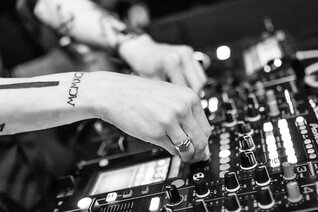How letting go of control allows you to create better music
Here, Patrick McGuire explores the idea of letting go of control as an aid to the songwriting process, and why control and creativity are often at odds with each other.
Guest post by Patrick McGuire of the ReverbNation Blog
You might not realize this, but there’s an internal conflict that plays out whenever you write music. As songwriters, we carry the weight of our experiences and allow them to shape who we are and the music we make. Things like a traumatic breakup or the six months you backpacked across Europe inevitably show up in your music in subtle or overt ways. However, we often forget that our musical pasts have complicated impacts on the music we make in the present. Believe it or not, how you approached learning your first instrument could be bad for your songwriting process through an overreliance on control.
Why control and creativity are often at odds
Mastering an instrument like the drums, piano, or guitar for the first time is all about harnessing the power of control to make your mind and body work in certain ways. Developing the chops to perform scales, chords, and drum fills takes discipline and a great deal of focus. It takes months to attain rudimentary skills on an instrument and years to truly master them.
But the problem comes when experienced musicians approach songwriting the same way they tackled learning their main instruments. Discipline, rigidity, focus, control: these are all essential traits for learning a new instrument but can be detrimental for creative exploration in music. There are singular technical concepts when it comes to playing an instrument that never changes-–the way a drummer holds her sticks or how a guitarist’s fingers need to be placed on the fretboard to produce sounds.
The process of harnessing curiosity and creativity to make music is something that truly lives in its own universe. Yes, you’ll need some rudimentary musical skills and knowledge to generate ideas, but if you try to exert control over the writing process, you probably won’t be successful. To learn music, you have to embrace control. To write it, you have to let go and follow ideas wherever they take you.

Signs that your attachment to control is hurting your songwriting process are things like all of your songs sounding the same, feeling chronically bored everytime you write, not being able to finish songs, and your focus being more on things sounding perfect than creating meaningful music. If this sounds like you, you’ll need to make the conscious decision to relinquish control of your songwriting process and embrace vulnerability, failure, newness, and discomfort in the ways you create.
Blow up your writing process and start fresh
If you can’t give up control in the ways you typically write songs, start over and find new ways to create. This could be anything from writing on an unfamiliar instrument to beginning how you write songs in ways that are completely different to you. If you always start with a bass line or by strumming on your acoustic guitar, try writing lyrics or constructing a beat first. Doing this breaks things up and adds energy to your process.
Add newness and disorientation to your process
Explore new tunings on your guitar, unfamiliar time signatures in the beats you create, and try doing a lot with a little if you’re accustomed to creating with lots of instruments and production elements. Making yourself disoriented will force you out of a position of control because the usual musical boundaries you rely on will topple and you’ll be forced to make music in new and innovative ways.
Ask questions–lots of them
You don’t have to reinvent your musical identity or songwriting process to let go of control. Sometimes, it’s as simple as catching yourself in the act and embracing curiosity as a means for doing things differently. When you refuse to go through the motions in your writing process and ask questions instead, new musical opportunities present themselves and creative energy will unleash itself.
You’ll never be able to completely let go of control when you write music, and that’s not a bad thing. We need to be engaged and musically active when we write in order to be productive, and some amount of control and restraint is needed to stay in the game. But by approaching music creation with an open, curious mind, anything can happen, and that’s a beautiful thing.
Patrick McGuire is a writer, musician, and human man. He lives nowhere in particular, creates music under the name Straight White Teeth, and has a great affinity for dogs and putting his hands in his pockets.